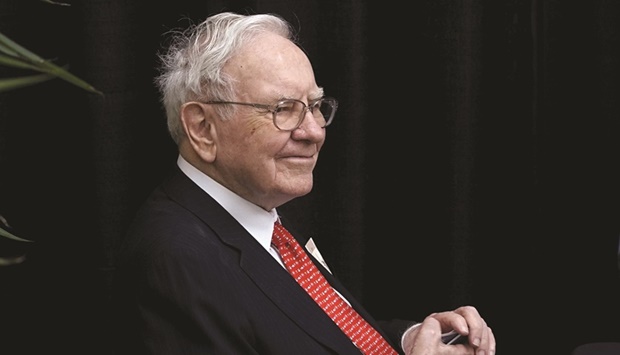The slide in US stock prices punished Berkshire Hathaway Inc’s bottom line in the second quarter, as the conglomerate run by billionaire Warren Buffett yesterday reported a $43.8bn loss.
Berkshire nevertheless generated nearly $9.3bn of operating profit, as gains from reinsurance and the BNSF railroad offset fresh losses at the Geico car insurer, where parts shortages and higher used vehicle prices boosted accident claims.
Rising interest rates and dividend payouts helped insurance businesses generate more money from investments, while the strengthening US dollar boosted profit from European and Japanese debt investments.
Despite the huge net loss, “the results show Berkshire’s resilience,” said James Shanahan, an Edward Jones & Co analyst who rates Berkshire “neutral.”
“Businesses are performing well despite higher interest rates, inflation pressures and geopolitical concerns,” he said. “It gives me confidence in the company if there is a recession.”
Berkshire also slowed purchases of its stocks, including its own, though it still had $105.4bn of cash it could deploy.
Investors closely watch Berkshire because of Buffett’s reputation, and because results from the Omaha, Nebraska-based conglomerate’s dozens of operating units often mirror broader economic trends.
Those units include steady earners such as its namesake energy company, several industrial companies, and familiar consumer brands such as Dairy Queen, Duracell, Fruit of the Loom and See’s Candies.
“Berkshire is a microcosm of the broader economy,” said Cathy Seifert, a CFRA Research analyst with a “hold” rating on Berkshire. “Many businesses are enjoying improved demand, but they are not immune to higher input costs from inflation.”
In its quarterly report, Berkshire said “significant disruptions of supply chains and higher costs have persisted” as new Covid-19 variants emerge and because of geopolitical conflicts including Russia’s invasion of Ukraine.
But it said direct losses have not been material, despite higher costs for materials, shipping and labour.
Net results suffered from Berkshire’s $53bn of losses from investments and derivatives, including declines of more than 21% in three major holdings: Apple Inc, Bank of America Corp and American Express Co. Accounting rules require Berkshire to report the losses with its results even if it buys and sells nothing.
Buffett urges investors to ignore the fluctuations, and Berkshire will make money if stocks rise over time.
In 2020, for example, Berkshire lost nearly $50bn in the first quarter as the pandemic took hold, but made $42.5bn for the full year.
“It shows the fickle nature of markets,” said Tom Russo, a partner at Gardner, Russo & Quinn in Lancaster, Pennsylvania, who invests more than $8bn, of which 17% is in Berkshire. “It’s business as usual at Berkshire Hathaway.”
The Standard & Poor’s 500 fell 16% in the quarter.
Berkshire’s quarterly net loss was equal to $29,754 per Class A share, and compared with a net profit of $28.1bn, or $18,488 per Class A share, a year earlier.
The $9.28bn of operating profit, or about $6,326 per Class A share, rose 39% from $6.69bn a year earlier.
It included $1.06bn of currency gains on foreign debt.
Revenue increased 10% to $76.2bn.
Geico suffered a $487mn pre-tax underwriting loss, its fourth straight quarterly loss.
“All auto insurers have been dealing with inflation in claims costs,” Seifert said. “Geico has been less successful than some at passing through rate increases and retaining customers.”
The loss was more than offset by a $976mn pre-tax gain in property and casualty reinsurance, and a 56% jump in after-tax in insurance investment income to $1.91bn.
Profit rose 10% at BNSF, with higher revenue per car from fuel surcharges partially offsetting lower freight volumes, while profit from Berkshire Hathaway Energy rose 4%. Berkshire repurchased just $1bn of its own stock, down from $3.2bn in the first quarter, and compared with $51.7bn in 2020 and 2021.
Its $6.15bn of stock purchases fell from $51.1bn in the first quarter, when it took major stakes in oil companies Chevron Corp and Occidental Petroleum Corp.

Warren Buffett, Berkshire Hathaway CEO.
